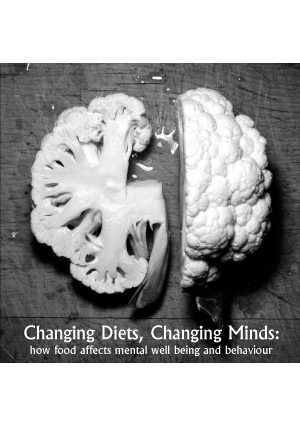Reports • Food & Mental Health
Changing Diets, Changing Minds - how food affects mental health and behaviour
 The report pulls together the published evidence linking what we eat to how we feel – from foetal brain development to adolescent behaviour through to Alzheimer’s disease.
The report pulls together the published evidence linking what we eat to how we feel – from foetal brain development to adolescent behaviour through to Alzheimer’s disease.
Due to both the quantity and quality of the evidence (epidemiological, physiological and through randomised controlled trials), the report proposes that the changes to the food system seen in the past century may be partly responsible for the rise in mental health and behavioural problems at the same time.
Issues addressed throughout the lifecycle include: preconceptual nutrition; maternal nutrition and foetal development; cognitive advantages of breastfeeding; diet and academic attainment and anti-social behaviour in childhood and adolescence; day-to-day food-related mood changes in adults; and cognitive decline in older people in relation to a life time of diet.
Specific mental diseases discussed include: ADHD, depression, schizophrenia and dementia (particularly Alzheimer’s disease).
This research is then placed in the context of our changing diets – addressing diet and evolution, the agricultural and Industrial revolution and the upheaval of the 20th century (namely processed foods, food additives, industrialised farming, animal fat, declining fish stocks and the increasing use of pesticides). The roles of specific nutrients such as essential fatty acids (omega-3, or fish oils, and omega-6), hydrogenated (or trans) fats and various micronutrients (e.g., selenium, magnesium, iron and vitamin C) are also examined.
The report was researched and written by Sustain project officer Courtney Van de Weyer.
Publication contents
Acknowledgements
An important note on the nature of this report
Foreword
Summary
Introduction
- The cost of mental illness
- The purpose of this report
- Resistance to the link
- The role of food?
The science of nutrition and the brain
- Conclusion
- Micronutrients, oxidation and other factors
- Essential fatty acids
- Nutrients and neurons
- Acetlycholine
- Catecholamines
- Serotonin
- Nutrients and neurotransmitters
- Essential nutrients for the brain
- How the brain is made
- How the brain works
- How do nutrients physically affect the brain?
- How the nutrients are used
- Micronutrients - vitamins and minerals
- Carbohydrates
- Dietary fats
- Proteins
- What do we need to eat?
Diet, brain development and mental well being throughout the lifecycle
- Conclusion
- Pesticides
- Nutrients
- Parkinson's disease
- Fats and vegetables
- Micronutrients
- Older people
- Micronutrients
- Tryptophan and tyrosine
- Macronutrients
- Meals and foods
- Adults
- Anti-social behaviour
- Academic attainment
- Childhood and Adolescence
- Anaemia
- General malnutrition
- Pre-term infants
- Cognitive advantages of breastfeeding
- Breastfeeding and infant formula
- Infants and early childhood
- Toxic substances
- Micronutrients
- Essential fatty acids
- Maternal nutrition and foetal development
- Folic acid
- Low birth weight
- Preconception
- Birth weight
- Nutrition in prenatal, postnatal and early life stages
The role of diet in specific mental health conditions
- Conclusion
- Summary
- Research trials
- Relevant physiology in those with Alzheimer's
- Dietary epidemiological evidence
- Dementia, particularly Alzheimer's disease
- Summary
- Tardive dykinesia
- Antioxidants
- Polyunsaturated fatty acids
- Research trials
- Relevant physiology in those with schizophrenia
- Coeliac disease
- Breastfeeding and prenatal nutrition
- Dietary epidemiological evidence
- Schizophrenia
- Summary
- Polyunsaturated fatty acids
- Vitamins
- Neurotransmitter precursors
- Research trials
- Oxidation
- Polyunsaturated fatty acids
- Micronutrients
- Neurotransmitter precursors
- Relevant physiology in those with depression
- Dietary epidemiological evidence
- Depression
- Summary
- Sugar
- Micronutrients
- Polyunsaturated fatty acids
- Nutrients
- Few foods diets
- Research trials
- Relevant physiology in those with ADHD
- Dietary epidemiological evidence
- Food additives
- ADHD
Changing diets and the implications for our mental health
- And the results?
- Pesticides
- Animal fat
- Industrialised farming
- Food additives
- Processed food
- What are we eating now?
- Upheaval in the 20th century
- The Industrial Revolution
- Agricultural revolution
- Diet and evolution
- An historical perspective
Conclusion and recommendations
- What policy makers could do now
- Fish stocks: No more food for thought?
Organisations to contact for more information
References

Changing Diets, Changing Minds - how food affects mental health and behaviour
ISBN: 1-903060-40-0 - 128pp - 2006 | 950Kb
Published Sunday 1 January 2006
Food & Mental Health: The project promotes understanding of the links between good diet and mental wellbeing, addressing the many implications of the growing evidence linking what we eat to the way we feel and behave.